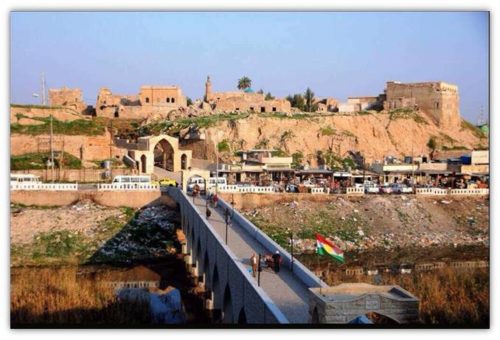Washington Kurdish Institute
May 28, 2019
The term “Disputed Territories” became official in Iraq after the Iraqi Constitution was approved by Iraqis, including Kurds, in 2005. Of course, the term is yet another way to hide the historical facts regarding the Kurdish-majority areas of Iraqi Kurdistan, mainly the oil-rich Kirkuk region and Shingal. The Kurdistan region has changed the term “disputed “in its official communications to “Kurdistan areas out of Kurdish administration,” a term the Kurds should have included in the 2005 draft constitution. Many of the Kirkuk region districts and sub-districts have experienced demographic changes due to the Arabization policy pursued since the creation of Iraq in 1921, changes which peaked during the Ba’ath regime from 1968 to 2003. The history of the region and presence of oil in Kirkuk make it unlikely the Iraqi government or regional powers would support a solution granting increased political rights, autonomy, or independence to Kurds in the “Disputed Territories.”
Kirkuk has suffered demographic changes due to the replacement of its Kurdish population with Arab tribes. These policies were pursued primarily due to the presence of natural resources like oil in the region and have created long-standing issues for its Kurdish population. The policies started with adjustment of the administrative borders of Kirkuk in the 1970s and 1980s. The Ba’ath regime also confiscated approximately 1.2 million acres of Kurdish-owned agricultural land and officially banned Kurds in the “Disputed Territories” from owning any businesses or properties in 1997.
Article 140 of the Iraqi Constitution, meant to rectify the situation beginning in 2005, was never implemented due to a lack of desire on the part of the federal government. This ensured the fate of the region’s farmlands remained undecided despite the return of the Kurdish population from 2003-2017. The Kurds were somewhat confident that their lands confiscated by the Arab tribes would be safe until Article 140 was implemented. However, on October 16, 2017, Iraqi forces, on the command of former Prime Minister Haider al Abadi, attacked Kirkuk, removed the Peshmerga, and seized control of the province. In addition to the war crimes committed during the attack on Kirkuk, Abadi appointed an Arab governor, Rakan Saed, to run the Kurdish-majority province. The acting governor, facing no opposition from the federal government, has restored the Arabization policies in Kirkuk by returning Arab tribes who left the Kurdish lands following the fall of the Saddam Hussein regime in 2003. Among other things, these transplanted Arabs are threatening Kurds and secretly harvesting their farmlands. Simultaneously, Kurdish-owned farmlands are being set ablaze in several areas of Kirkuk and other locations like Khanaqin city in Diyala province.
While some of these acts are carried out by ISIS (Da’esh), ostensibly following Kurdish farmers’ refusal to pay extortion money to the terrorist group, there are also suspicions some are committed by those looking to drive Kurdish residents out of the “Disputed Territories.” These suspicions are fueled by the fact most fires occur near the highways and city of Kirkuk, areas where large numbers of Iraqi security forces are deployed and tasked with implementing martial law.
Da’esh terrorists have been much more active in the “Disputed Territories” since October 2017, when Peshmerga were replaced by Iraqi security forces and Iranian-backed militias. Today, many villages, especially in the Hawija district, fall under Da’esh’s control after sunset. Da’esh also targets Iraqi security personnel in the area. That said, Iraqi forces refuse to allow Peshmerga to return to the region, even in a joint capacity, to address the worsening security situation.
At the same time, regional powers like Iran and Turkey have been taking advantage of the situation in Kirkuk. Iran now has a solid base in Kirkuk thanks to its proxy-militias stationed there since October 16, 2017. Turkey also plays a role via the minority Turkmen population and uses their politicians to advance Turkish interests and destabilize the region. Both Iran and Turkey will continue to reap the benefits of instability caused by the ongoing disputes between Baghdad and the Kurdistan Regional Government (KRG) through political gains and increased economic benefit, as they have in other parts of the Middle East.
To stabilize Kirkuk, the new Iraqi government headed by Adel Abdul Mahdi should address the security situation and immediately stop the Arabization policies of the former regime which have also affected some Turkmen Shiites. Mr. Mahdi has achieved some success in repairing damage caused by Haider al Abadi to relations between the Iraqi government and Kurds. Mr. Mahdi should complement these efforts by allowing a joint security operation involving both Peshmerga and Iraqi forces. Peshmerga are native to the region and more experienced than the Iraqi security forces who have been suffering casualties on a daily basis. The United States and United Nations should mediate this stabilization effort since it will be mutually beneficial to both sides. The U.S. lost Kirkuk on October 16, 2017, when it allowed Iranian-backed militias to attack Kirkuk and played the role of observer instead of acting to protect America’s national security and the interests of a free and democratic Iraq.
Both the KRG and Baghdad should investigate the arson attacks on Kurdish farmlands and find out who is responsible, as such actions are liable to exacerbate an already tense situation in the region. The two sides should also collaborate to halt the Arabization policies restored by the acting governor of Kirkuk. Many Kurds accuse the acting governor of repeating the policies of Saddam Hussein. Finally, the solution to Kirkuk and the other “Disputed Territories” can only be solved by implementing the Iraqi Constitution’s Article 140, which has not happened since the ratification of the Iraqi Constitution in 2005.

